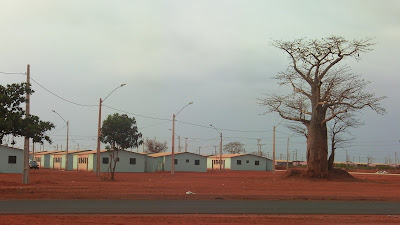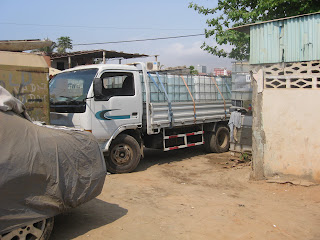Distribution of water.1000 litres cost approximately 20 dollars
This is one way people get rid of waste, by burning it.
I don't intend to begin all my posts with the power status in the bairro, but I can't help doing that today... There is no power, nothing, nada, rien!! It's interesting to see how people here have learnt to deal with this quite well over the years. Yesterday, L.D. - who has always lived in Chicala – was telling me that this area until recently was not covered by this infrastructure at all. He said something about the government providing energy to bairros close to elections time...
Chicala is lacking many things. One has to live here to understand the dynamics of both people and space and how they manage to cope with all sorts of problems. And I am not just talking about the poor access to the bairro and people's houses, the complete lack of water, the constant blackouts, and the low quality of the built environment, it goes way beyond that. This particular area, as well as others in Luanda, is changing rapidly and people here are aware that, sooner or later, everyone will have to move out of Chicala. Where to? No-one seems to have an answer for that just yet. What they do know is that they will lose their current life, their references, livelihoods, and close contact with their neighbours and friends. Moreover, and because Chicala is so close to the city centre, the privilege of quickly getting to the city, where many of the people work, will also be lost.
I have been talking about this issue quite a lot with different people, and I can say that the feeling of uncertainty and insecurity towards their future is implicit in every word spoken.
A few days ago, I was told that this bairro will probably be demolished in about one year time (part of it is already gone). I can't help wondering what I will find here when I return to Angola, and where will these people be living...
I am still getting used to daily life here. Getting a full night sleep is particularly difficult, since there is always something happening somewhere - which usually involves music, or very loud music to be more accurate. Last night for example, there was another concert a few hundred metres from my house :) Of course there is no such thing as insulation or double glazing, so you hear pretty much everything as if it is happening inside your house. Oh, and let's not forget the noise coming from all the generators working at the same time when the power is off...
Last night I don't know why but I woke up at around 3am and could not sleep for another couple of hours... The nights are very hot and slightly uncomfortable, and all I could think about was how itchy the mosquito bites on my legs are!! I should probably try another type of insect repellent. The one I used in Ghana was completely useless and now I am beginning to think the same of the one I am currently using... I HATE MOSQUITOES!!!
On a more positive note, I was told about about 2 markets close-by where people usually buy all sorts of building materials to build their houses. Hopefully I'll manage to go there this or the following week, just to have a general idea of prices. From what I understand the only materials manufactured and sold within the neighbourhood are cement blocks. All the other stuff are mainly acquired in the markets.










































